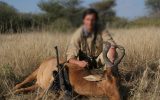Namibia has adopted a number of innovative approaches to achieve biodiversity conservation, economic development and improved community livelihoods. This has led to a remarkable recovery and increase of wildlife populations, including key predator species and internationally threatened or endangered species such as elephant and black rhinoceros.
Despite these successes, living with wildlife often carries a cost. The increase of wildlife populations and expanded ranges into communal and freehold farming areas has resulted into more frequent conflict between people and wild animals. Particularly, encounter with elephants and predators such as lions and leopards has been reported in many areas. This has resulted in livestock and crop losses, damage to water installations and, in some instances, loss of human lives.
It has been recorded, that about 1350 head of livestock (including cattle, sheep, goats, donkeys and horses) were killed by predators during 2020 in conservancies and on non-conservancy areas on state land and resettlement farms. So far, wild animals that are known to cause conflict includes: elephants, buffaloes, lions and wild dogs. According to the Ministry of Environment, Forestry and Tourism (MEFT), a number of human wildlife conflict incidents involving elephants, buffaloes and predators are being reported on a daily basis in some parts of the country. Crocodiles and Hippopotamus are also known to come in direct confrontation with humans, which in some cases is often a result of human negligence.
The Ministry of Environment, Forestry and Tourism (MEFT) has revealed that, it has been impossible for the government to pursue a policy of direct compensation to individual farmers because of the estimated cost of damage caused by wildlife across the country. More importantly, the administrative problems that a compensation scheme presents. It is for these purposes that the National Policy on Human Wildlife Conflict Management was developed in 2009. This policy strives to manage Human Wildlife Conflict (HWC) in a way that recognizes the rights and development needs of local communities while at the same time recognizing the need to promote biodiversity conservation. This policy has been revised and updated in 2018 to reflect changing circumstances, new thinking regarding HWC and the results of experience in addressing HWC management issues on the ground over the past years.
According to MEFT, it must be taken into account that is it is not government policy to provide compensation to farmers for losses due to wild animals. Furthermore, compensation schemes implemented elsewhere have proved to be very problematic and open to abuse. The ministry has further added that, there is a need to find other means to offset the losses caused by wildlife and at the same time build the self-reliance of farmers. However, there is a moral obligation by government to assist farmers who incur losses as a result of wild animals. The government through the Ministry of Environment, Forestry and Tourism therefore has no compensation scheme for damages caused by wild animals. What is there, is the Human Wildlife Conflict Self Reliance Scheme, basically an offset system and not a compensation policy.
Addressing Human-Wildlife Conflict requires striking a balance between conservation priorities and the needs of people who live with wildlife. It is for this reasons that the Ministry of Environment, Forestry and Tourism is intensifying efforts to manage the conflict, and specific mitigation and preventative measures are being put in place to manage the conflicts.
Wildlife conflicts have always existed where people and wildlife live together and may continue to do so in the future. This means that it will not be possible to eradicate all conflict, but that conflict has to be managed in the most effective and efficient ways possible. The Ministry of Environment and Tourism, have expressed sympathy with those who are experiencing conflicts with wild animals, and assured that they will continue to do everything possible to manage the conflict. The ministry also called upon all citizens to put measures in place to avoid human wildlife conflict in their specific areas.




















